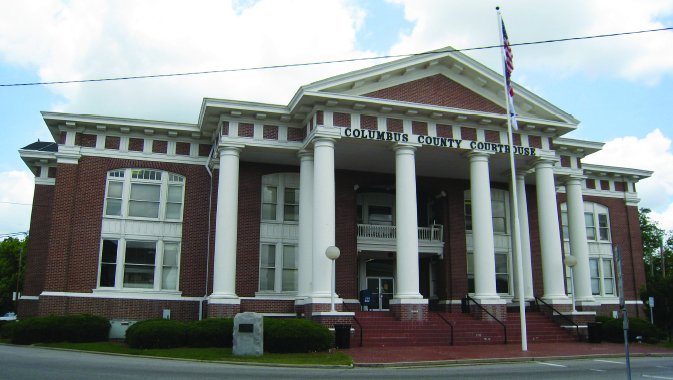Located in North Carolina’s coastal lowlands, Columbus County is a rural community of winding rivers, pristine lakes, and ecologically diverse natural heritage areas. Dotted with small towns and welcoming people, the county is known for both its friendliness and rich farmland.
~
Bisected by two railroads and several major roadways, Columbus County is located a short distance from the deep-water port in Wilmington, giving the local agriculture, manufacturing, and natural resource industries all the transportation options they need to ship goods in and out of the county.
The third largest county in the state by landmass, Columbus County’s 954 square miles are home to just 58,000 people. “We have fewer people here than in the suburbs of Wilmington,” says Gary A. Lanier, Director of the Columbus County Economic Development Commission. However, the county’s location provides residents of the sparsely populated community quick access to urban areas, including the state capital of Raleigh, and a range of amenities, from museums and restaurants to the region’s popular beaches.
The major tourist destination of Myrtle Beach, South Carolina, is just a 30-minute drive from the border of Columbus County, giving local residents the best of both worlds. “We have easy access if you want to go to Myrtle Beach and play golf, or if you want to see shows at the Alabama Theatre, the Palace Theatre, or the House of Blues. You can go down and catch a concert, you can go eat at a nice restaurant, you can go to the beach, and yet when you come home you are out of all that beach traffic and away from all the tourists.”
The county’s rural character makes it an outdoor enthusiast’s paradise. Both the Lumber and Waccamaw Rivers wind through the County before flowing into the nearby Atlantic Ocean. “The Lumber River was selected as one of the top ten natural and scenic wonders within the state of North Carolina,”Dr. Lanier remarks. “It’s a great river to kayak or canoe down, and is also great for fishing.” Hunting and hiking are also popular outdoor activities throughout the county.
One of the largest natural lakes on the East Coast, Columbus County’s Lake Waccamaw is known for its unique ecological phenomena and endemic species, which are found nowhere else in the entire world. The shallow 9,000 acre lake is one of the county’s best kept secrets; tourism and development have never been encouraged along its 14 miles of shoreline, allowing the waters to remain largely untouched. Locals enjoy boating, hiking, fishing, picnicking, and camping at Lake Waccamaw State Park.
Columbus County’s waterways are not as widely recognized as some other bodies of water in eastern North Carolina such as the Cape Fear River, the Albemarle Sound, or the Pamlico Sound. But, Dr. Lanier points out that living just beyond the state’s coastal tourist attractions does have its advantages. “You can’t build a factory in the Pamlico Sound, you need affordable land,” he explains. Columbus County has a wealth of land ready for industrial development with several State Certified Industrial Parks – and the infrastructure already in place to support production and move goods.
A new railroad deal will make it even easier to transport goods. The county is fortunate to enjoy access to the CSX Railroad, a major railway that crisscrosses the nation and leads to major ports and markets. However, a short line railroad running through the county fell into disrepair in recent times and has been sitting idle for several years. In August, the R.J. Corman Railroad Group bought the ailing Carolina Southern Railroad Group for $13.9 million. Restoring the track will require at least another $4 million and the company plans to have trains running again by the end of the year.
The sale will be a boon to the entire region. “They are a top notch railroad company,” Dr. Lanier explains. “The R.J. Corman Group has received the short line of the year award; they have one the best safety records of any short line railroad company in the entire country.” The company is already working to bring in more business to Columbus County. “They have an outstanding economic development person. He is already working hand in hand with us in marketing a large industrial site that we have available. I view it as a great partnership. They are aggressive about wanting to create jobs and want to create more industrial sites along the rail line.”
Incoming businesses can take advantage of a range of incentives and economic development grants at both the state and local level, and local leaders offer additional assistance. “We have a tremendously supportive group of local business leaders and County Commissioners,” Dr. Lanier shares. This support may even include picking up the tab when the county’s budget falls short. “Give me one other county in the state of North Carolina that could have three of their County Commissioners pay every expense out of their own pockets and travel all the way to China with their local economic development director to provide support on a recruiting trip. That is the kind of support I have from my County Commissioners.”
In addition, The Columbus Jobs Foundation is dedicated to promoting job creation in Columbus County. Members donate their time and money to help better the community’s economic condition, spending their personal resources to do everything from hosting lunches to flying in potential investors. For example, “a Jobs Columbus Foundation member donated the use of his private plane and pilot to fly all the way to Tennessee, bring [a potential investor] over for a site meeting and luncheon with local officials and business leaders, and then flew him back to Tennessee. When you’ve got that kind of support for economic development efforts, it makes a difference.”
Dr. Lanier feels personally invested in the county’s economic development as well. “My job is to help the citizens of Columbus County by helping clients to successfully launch a business or manufacturing firm here, or to help an existing business expand. If it creates jobs, that helps everyone in the county.” No potential company is too insignificant to escape his attention. “Economic developers in some areas are only interested in a project if they can create 50 or 60 jobs. But I don’t care if it’s a company that will only hire five people. Because for five unemployed people who are trying to make ends meet and feed their children, those five jobs are the five most important jobs in the world. If you don’t look at it that way, you probably don’t need to be in a job like mine.” Mr. Lanier is well prepared to provide the support that incoming or expanding businesses need. “I’ve lived in this county for 16 years, so I pretty much know who’s who and where you can get help… I know where I can get the support needed to be successful both at the local level and at the state level.”
Columbus County also receives support from North Carolina’s Southeast, a regional public-private partnership that markets the state’s southeastern counties nationally and internationally. “Everyone in southeastern North Carolina looks to them as the primary source for recruiting clients to come look in our area,” Dr. Lanier explains. “We are a big county but… we don’t have beachfront property in our tax base like [neighboring] New Hanover County or Brunswick County, so our budget is limited. We rely heavily on our partnership with North Carolina’s Southeast to help market us as well as the rest of the area.”
The region’s rich agricultural heritage combined with its expanding infrastructure make Columbus County an ideal location for an agri-business and food-processing cluster. The Southeast Regional Park, located in the center of the county, is not only a State Certified Site, but has also been designated as a Certified Food Site by Garner Economics and Primus Builders. It is in the final stages of being designated as a certified as a Food and Beverage Site by Duke Energy. Businesses related to metalworking, distribution and logistics, and forestry are also good fits for the area. Columbus County is already home to West Fraser, “one of the largest yellow pine sawmills in North America, and probably the world.” Down the road, International Paper produces fluff pulp at the Riegelwood Mill, creating a product that is used to make diapers and other personal hygiene products. Business is booming at the mill, and the company currently has a $128 million expansion underway.
Council Tool has been a fixture in Columbus County since 1886 – and is still owned by the same family. The fourth generation of the Council family continues to make their world-renowned tools locally, despite the pressures to go overseas. “At one point they were the only remaining hand tool manufacturer in the United States,” Dr. Lanier remembers. “Everything had gone offshore.”
Atlantic Packaging is another homegrown Columbus County business. The company got its start when a young journalist named W. Horace Carter launched a small town weekly newspaper in Tabor City. Using his newspaper as a platform from which to fight the Ku Klux Klan (KKK), Mr. Carter managed to purge his community of the organization’s influence, winning the Pulitzer Prize for his efforts. Mr. Carter’s company gained national attention for fighting injustice and has been growing successfully ever since, eventually evolving into the market leader in industrial packaging and customized converted paper products. Still owned and operated by the Carter family, Atlantic is “in the top 25 privately owned companies in North Carolina. It is really a good old Carolina success story.”
Agriculture remains one of the strongest sectors in Columbus County. “We have a real strong farming community,” Dr. Lanier points out. The county leads the state in the production of a number of agricultural products, and locals celebrate this success with a string of festivals including the North Carolina Watermelon Festival, the NC Pecan Harvest Festival, the NC Strawberry Festival, the NC Yam Festival, and the Pine Tree Festival.
From farms and paper mills to industrial packagers and tool manufacturers, businesses in Columbus County have easy access to dependable labor. “We have a very good workforce with a great community college to support workforce development.” A strong work ethic is common throughout the area. “You have that positive, get it done attitude amongst the workers in the county,” Dr. Lanier states. This hard-working attitude – and the friendly culture – can be traced back to the community’s agricultural roots, he adds. “Farmers are the salt of the earth. They are just good, solid people and that is the kind of folks that we have here. Many members of our workforce were raised on a farm – they have a solid work ethic. ”













